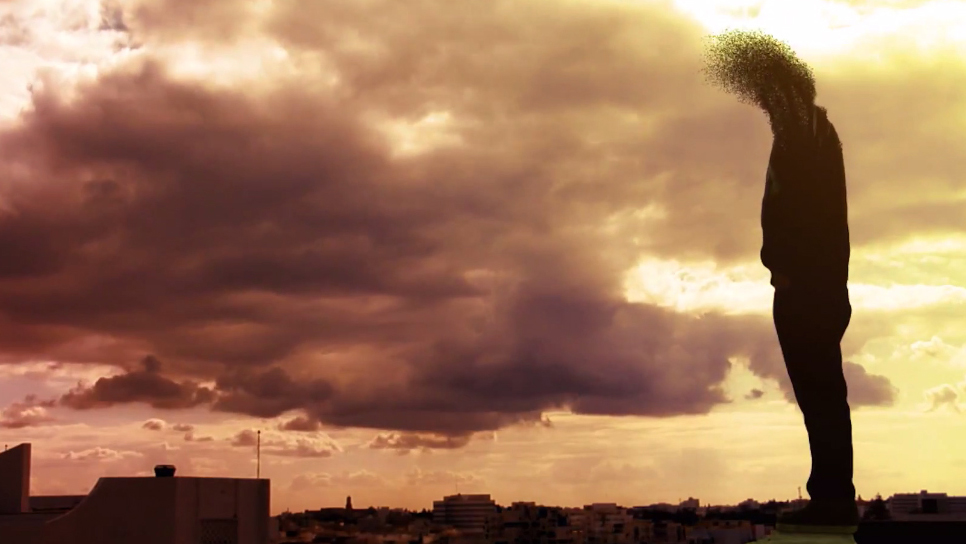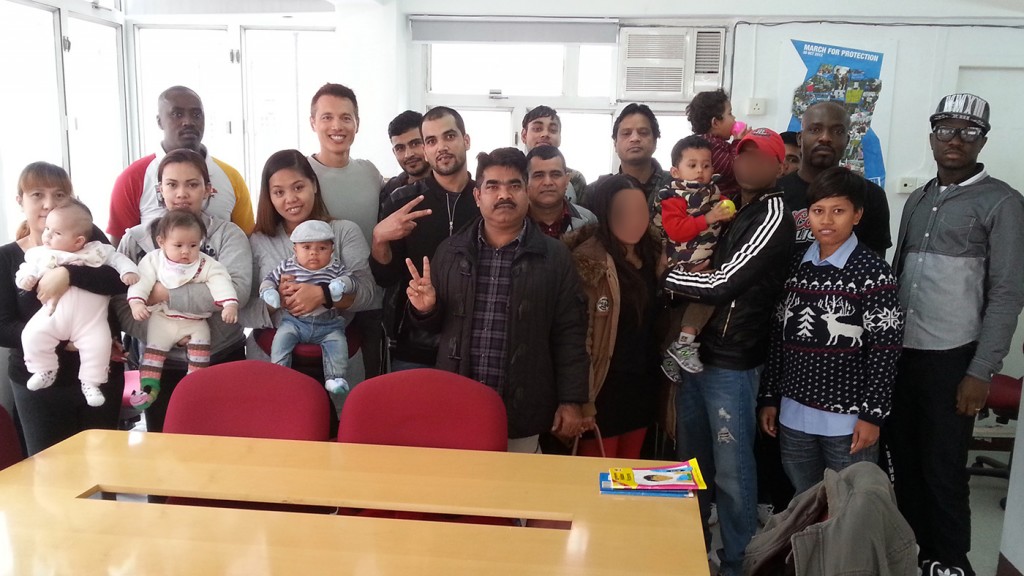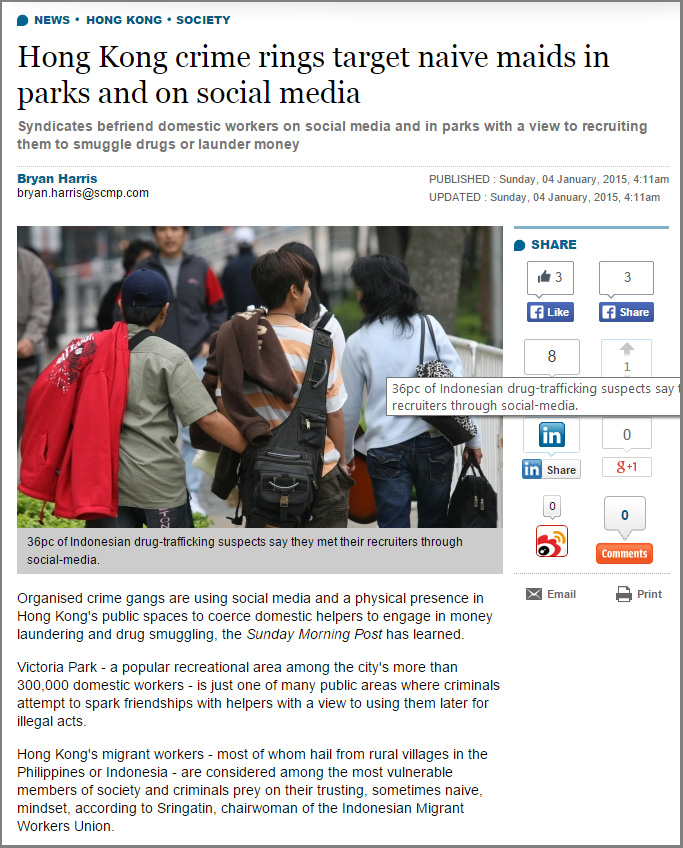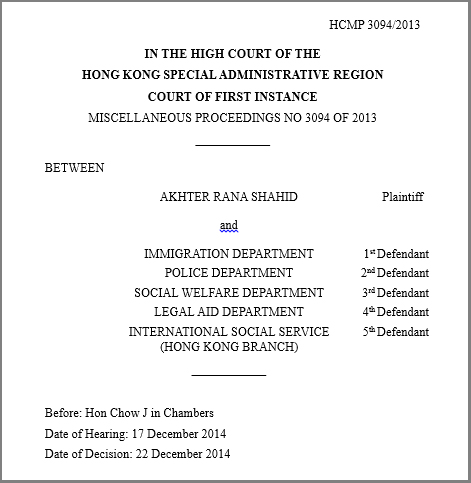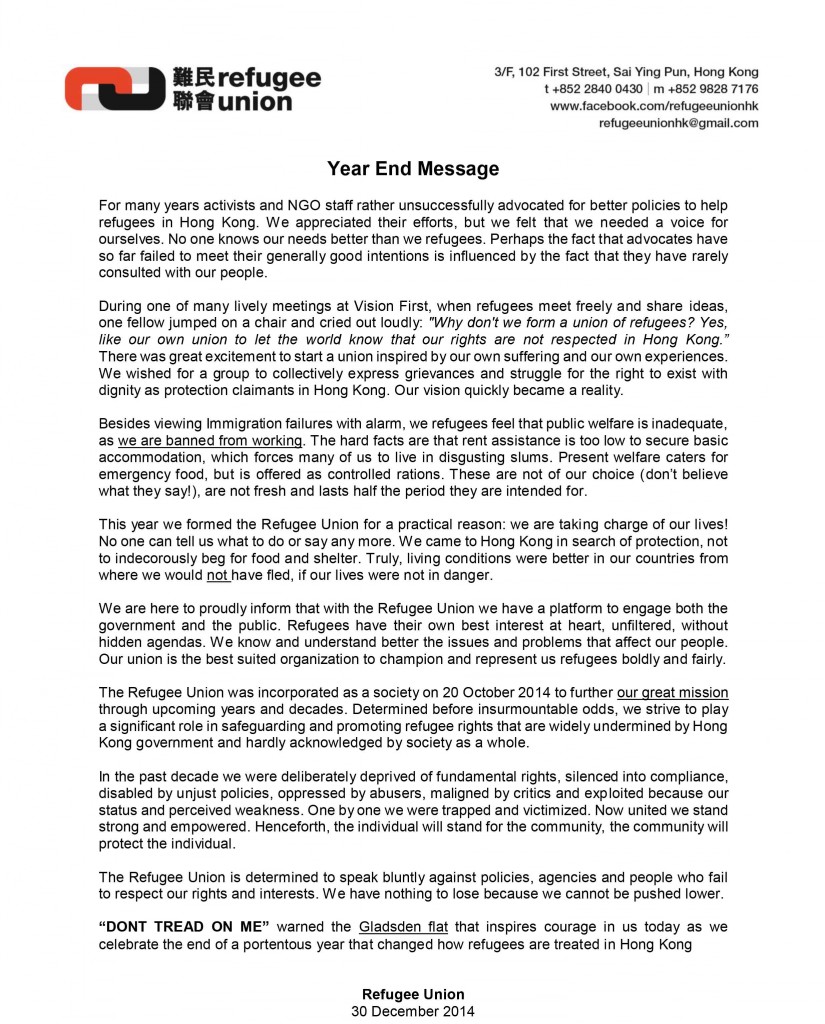Refugee child denied standard level of assistance
Jan 6th, 2015 | Food, Housing, Welfare | Comment
A few days ago Vision First wrote to the Child Protection institute querying if they had taken into consideration refugee children when writing to the SCMP saying the government is doing all it can to prevent destitution. Apparently, if the government is, its contractors are not.
Vision First reported to the Social Welfare Department the reprehensible treatment of a refugee child who has been allegedly denied rent, utility and adequate food assistance for reasons unexplainable. The boy, Samuel, was born in 2013 to a Pakistani father and Indonesian mother.
Samuel was issued with an Immigration Recognizance Form in August 2013, after which the parents requested he be added to their Agreement on Provision of Assistance. However, the mother laments, “Our caseworker refused to add our boy, because she said it was not necessary and we already got enough help.”
For reasons that remain unclear, young Samuel was not recognized by SWD contractor ISSHK as a ‘service user’ entitled to standard levels of assistance for rent, utilities and food, as determined by the Hong Kong Government. Raising a family is expensive and refugee parents are denied the right to work.
At the core of the matter was the parents’ request to change their lodging because the room in which they lived had become too small for a unit of three. They therefore located what they thought could be a suitable room priced at 4500$. However, since August 2013 the family was told by their ISSHK case-worker that the small room they occupied was sufficient and it was unnecessary for them to relocate. The caseworker (name withheld) refused to pay the security deposit and first month rent.
The family reports that ISS-HK also did not increase the electricity allowance and failed to provide sufficient food for Samuel. In recent months, the two year-old boy was allocated one box of cereal, one can of milk formula (900gr) and 10 eggs for a 10 day period. The mother, who could not breastfeed, laments that her son would finish the formula in 5 days as he didn’t have solid food.
The distress mother complained to Vision First, “This is too much painful. Why they can treat us like that?”
Good question! From our experience, it is claimed that each case is different and a case-by-case assessment is implemented, as if this was reason sufficient to dispel complaints concerning some receiving more and others less than what is said not to exist, but is factually a “Refugee Welfare Package”. In this light, Vision First is greatly concerned about what seems to be an arbitrary, biased treatment, particularly because the family claims they were told “the manager did not agree” as an explanation of service refusal.
Vision First calls on the SWD to promptly investigate this case and explain to this family, and the community in general, what guidelines are in place in this cases, why ISS-HK decided that this family should not move to a larger room after having a baby, why their utility allowance should not be increased and why Samuel was punished with a reduced food allowance at a critical stage of growth and development.
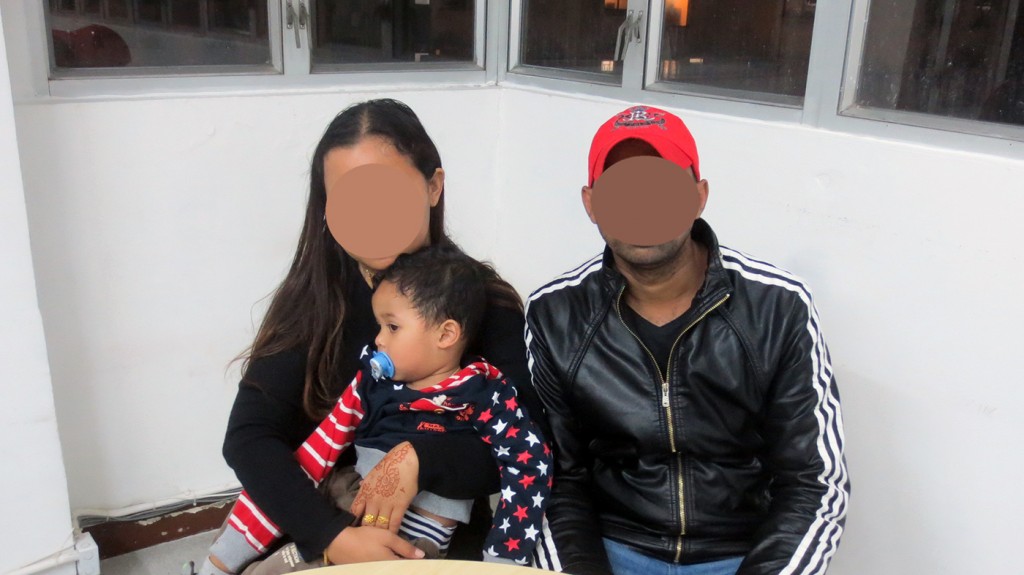
VF Report: Slum on the Hilltop ordered to be purged by Lands Department
Jan 5th, 2015 | Crime, Housing, VF Report | Comment
On 13 September 2013, Vision First reported on the Slum on the Hilltop where ISS-HK paid rent for many refugees at least since 2010, according to the oldest resident interviewed. We were informed that other refugees had lived at this location earlier, under the auspices of ISS-HK, before moving elsewhere.
At this slum Vision First collected copies of numerous Agreements on Provision of Assistance, issued by ISS-HK and duly signed by caseworkers, confirming that the refugees in question were said to officially reside at the following addresses. We cannot but query if any of them is indeed accurate:
- 6/F, House 18, Chuck San Tsuen, Yuen Long
- 89 Shek Tong Tsuen, Yuen Long
- 18 Chuk San Tsuen, Yuen Long
- DD116, Lot 1896, 1892 39 Chuk San Tsuen, Yuen Long
- 2788 Kong Tau Tsuen, Yuen Long
- G/F, House 18, Chuck San Tsuen, Yuen Long
- DD116, 1732 Chuck San Tsuen, Yuen Long
On the most part, the refugees we interviewed were visited by ISS-HK caseworkers in 2013 at the Slum on the Hilltop that was approved as a suitable residential location. It may be assumed that the purported landlord provided ISS-HK with adequate documentation for rent assistance (1200$ a month in 2013) to be approved for each refugee. This arrangement continued into 2014.
Vision First emphatically condemned this illegal structure as unsuitable for human habitation, an opinion that obviously we are not alone to share.
Fifteen months later, in December 2014, a Notice by the District Lands Office, dated 29 August 2014 informed refugees that structures had been erected at that location without approval, in breach of the conditions in the Government lease. The registered owner was required to purge the breach by demolishing or removing the unauthorized structures. Further lease enforcement action was threatened.
Vision First has learnt that following the above notice, ISS-HK caseworkers have allegedly: a) discouraged new refugee from settling in this slum; b) encouraged refugee tenants to find suitable homes and promptly move out; c) refused to approve the renewal of tenancy agreements at this location.
When the last tenants move out in a few months, the Slum on the Hilltop will be history, but questions of public concern remain
- Did the register owner inform ISS-HK that the metal containers and wooden boxes employed to house refugees were unauthorized structures unfit for human residence?
- Did ISS-HK caseworkers conduct due diligence to protect the safety and health of refugees before approving their settlement in this dangerous and unhygienic compound?
- What proof of ownership did the slum lord provide ISS-HK to facilitate rental payments from the public purse and crucially were said documents furnished to the SWD monitors?
- What measures is ISS-HK taking to relocate refugees suddenly forced out of slums, given that the current 1500$ rent allowance is wholly insufficient to secure a basic, legal room?
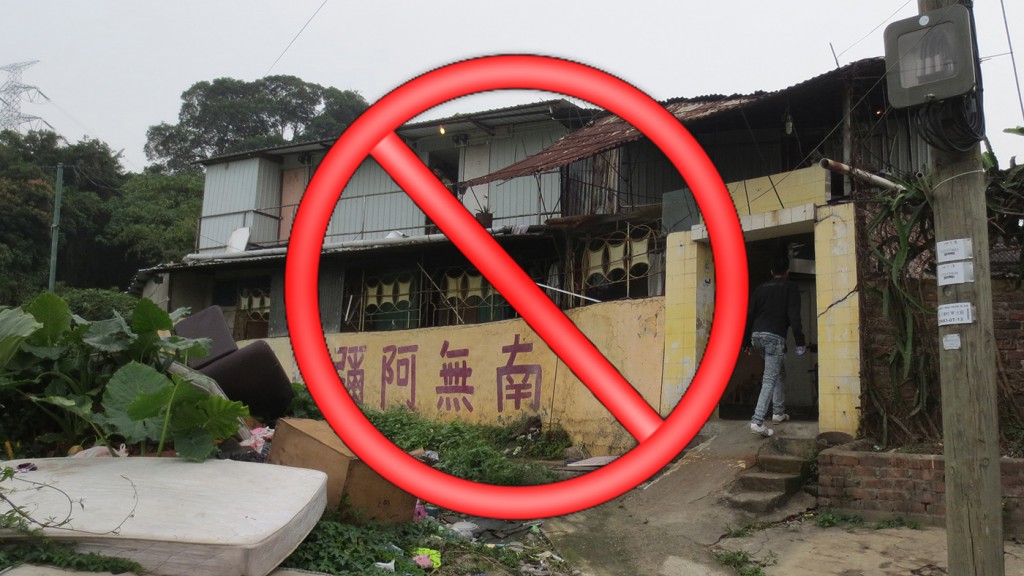
Hong Kong crime rings target naive maids in parks and on social media
Jan 4th, 2015 | Crime, Media | Comment
Are we refugees or prisoners?
Jan 4th, 2015 | Immigration, Personal Experiences, Refugee Community | Comment
Greetings to all friends and readers. I am Aameen and I was born 38 years ago in India. I have been a refugee in Hong Kong for 8 years and I hope this message will be read by all refugees, human rights people, NGO people and lawmakers in Hong Kong. I thank Vision First for offering this opportunity.
Every human being that is free has rights, but refugees are prisoners in Hong Kong because we do not have freedom. We cannot work so we are desperately poor. We cannot live in good place without money. We cannot eat what we like without money. We cannot take bus without money. We cannot phone without money. We cannot even write letter home without money.
Why in Hong Kong the lawmakers treat us worse than prisoners? We cannot rent room or buy any food, water, clothes, shoes and other daily things without money. Here for example, everybody whether they are rich or they are poor, whether they are educated or they are uneducated person, they can choose which toothpaste they prefer. Only refugees and prisoners cannot choose toothpaste flavour!
Refugees in Hong Kong must use all daily things and food what kind the ISS distributor give us. Dear Respectful Lawmaker, why refugees don’t have the right to work to buy what they need? If we are free people, is it not our right to work and buy and use what we need? We are refugees, not prisoners.
In 2011 I was sentenced 15 months prison for working illegally because the ISS didn’t give me the things I need. The Respectful Tuen Mun Court send me to Pik Uk Prison and inside there whatever they give me I use and I follow the rules. I ask the Respectful Lawmaker: Why in prison I can work and buy what I need, but in the outside world I cannot work and buy what I need?
So I politely tell you that even if we live outside with good character, refugees in Hong Kong do not have freedom and are treated worse than prisoners. How we feel freedom if we have no right to work and to buy what we need? Every human being has different choices and every free person has the right to choose. Why then refugees are not free to choose?
It means that for Hong Kong Government the refugees are not human beings. If we consider the world law as good for humanity and to protect human life, why the law in Hong Kong is not good for refugees and does not protect our life? Is this law good for human rights? Is it good for humanity?
So I have these questions for the Respectful Lawmaker: Why you don’t protect refugees? Why you don’t give basic human rights to refugees? Even if we forget about refugees and consider to the simple fact that we are all human beings, why you don’t respect refugees as human beings?
It is very sad that the Hong Kong lawmakers make a big difference between human beings and refugees! I will not request for any visa or work permit, I only and politely request treating refugees with respect as human beings. I ask why refugees don’t have fundamental rights? We always read in the newspaper that dogs and cats have more rights than refugees. Why must this be true?
From my point of view, I cannot understand who they consider refugees in Hong Kong, if refugee have no protection, no work, half assistance, no human rights and no respect. The law in Hong Kong pretends to give us full freedom, home, food and clothes, but we cannot even rent room and get enough food to eat. So please tell us, are we refugees or prisoners?
Dear Respectful Lawmakers, why are your human rights and my human rights separated?
(name, Immigration and contact details provided)
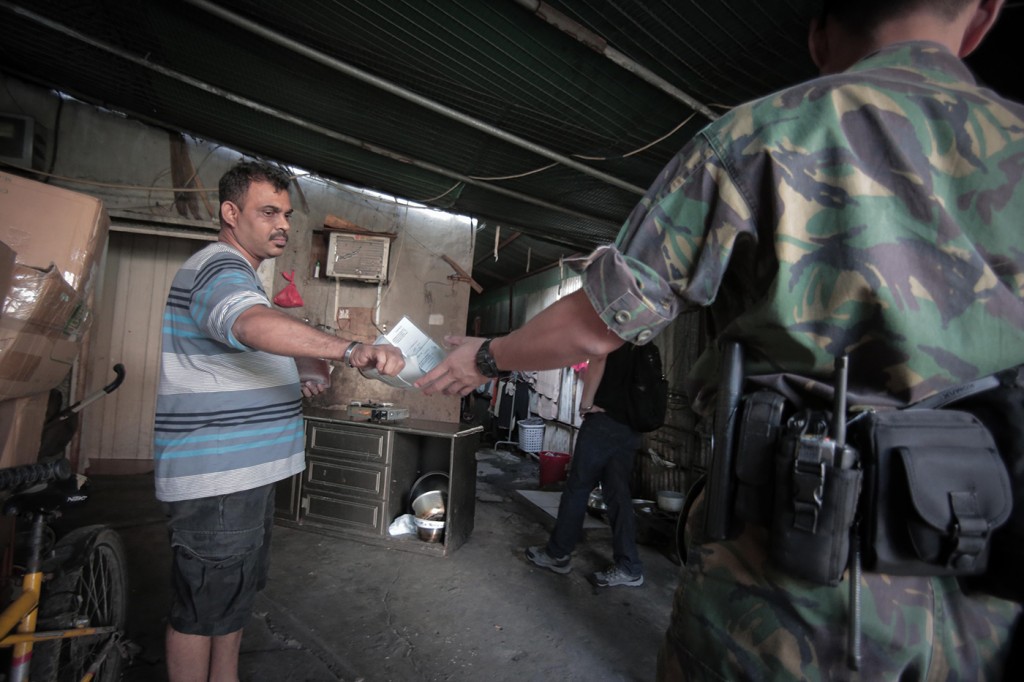
Lone Ranger battles asylum failures in court
Jan 3rd, 2015 | Legal, VF Opinion, Welfare | Comment
The emergence of the refugee activist is contagious! Over 2013 and 2014, Mr. Akhter Rana Shahid filed complaints against several government departments and the ISS-HK for these bodies were argued to have failed to protect him. The complaints were dismissed.
We do like to take this opportunity to contribute our views as the matters raised by the plaintiff are, we believe, of public concern. Although we haven’t had the pleasure of meeting Mr. Akhter Rana Shahid, we think the grievances dismissed by the Court of First Instance in HCMP 3094/2013 may not be as frivolous and vexatious as they certainly appear at first sight to unconcerned readers.
The following considerations should be made.
First, while the plaintiff filed separate complaints against the Immigration Department, Police, Social Welfare Department, Legal Aid and the ISS-HK, there seems to be a common thread that unites them: the lack of a comprehensive asylum procedure that causes refugees intolerable hardship. Some failures were listed by the seven originating summons, interestingly against some of the agencies at the forefront of the government attempt to contain, or simply manage, the asylum ‘problem’. In this vein, we are left with the uncomfortable feeling that the confused and scattered issuance of summons, as well as the unclear arguments put forward by the plaintiff, alleging circumstances that seem to miss the point though sound plausible, may be explained by the lack of legal representation. A paucity of Legal Aid approvals and the rarity of pro-bono support are issues that undeniably thwart refugees who resort to legal proceedings in person, hoping to find a sympathetic ear and justice. It is significant that on the one occasion that Mr. Shahid had legal representation he was awarded compensation for unlawful detention.
Second, in the burglary case, it is unclear how the investigation unfolded, but two issues seem clear. The plaintiff alleges he found a burglar in his home, and the burglar was surprisingly his landlord. Whether this person was in cahoots with ISS-HK is debatable. What seems plausible is the fact that, for political reasons, refugees are placed in a state of vulnerability that is implemented by ISS-HK, thereby drawing upon this agency the ire of refugees, with a predictable eruption of problems and confrontations. Further, the ISS-HK services, or lack of, can be said to cause innumerable disputes between refugees and bottom-tier landlords. It is accepted that refugees are compelled to settle in certain rooms, and at certain restrictive conditions, due to insufficient rent assistant. It is not new to us that some landlords take justice into their own hands and, if rent is not on time and in full, think nothing of threaten tenants, cutting electricity and water, locking them out of their homes and even stealing from them, safe in the knowledge that refugees (women in particular) often hold back from reporting such criminal behaviour to the police. When reports are made, police intervention generally dismiss such incidents as ‘personal matters’.
Third, the background situation raises grave concerns about the well-known problem of the welfare assistance to refugees being wholly inadequate. The glaring shortcoming is predicated on the misguided rationale that such benefits are indeed not welfare, but humanitarian assistance provided in-kind and only in a measure sufficient to prevent destitution, while discourage hopeful asylum seekers from coming to Hong Kong. The logic of this political decision is challenged by the evidence of widespread suffering across the refugee community, hardly justifiable by deterrent objectives. Despite a shameful reality plain for anyone to observe, inhumane policies and practices persist. Further, the ISS-HK and SWD assistance package is rarely vigorously challenged in court where the judiciary commonly takes the view of its sufficiency, as in the numerous cases of refugees convicted for taking up employment merely to pay rent and buy food. One can only query why and to whose advantage?
Fourth, while it is the duty of the Legal Aid Department to assess the merits of each application and prevent the waste of public funds in frivolous and vexatious claims, it is doubtful that Mr. Shahid was in a position to present full particulars and evidence in a professional manner without the assistance of a lawyer. We are not told the details, but a few questions come to mind: Did the police readily furnish records of the burglary investigation? And did ISS-HK provide details of partial rent payments that precipitated the plaintiff’s relationship with his landlord? Logic presumes that, if refugees are to be banned from working, then Hong Kong government should arrange accommodation and, if necessary, pay rent in full. Did the plaintiff make this critical connection clear to Legal Aid? Can refugees acting in person in court be reasonably expected to grasp legal requirements and procedures? That is, should they know how to present cases by themselves against well represented defendants? Can anyone in such a fraught state of mind (i.e. feeling persecuted at home and in HK) produce a compelling case to take on the Justice Department alone?
Ultimately, we believe that something important should be learned from Mr. Shahid’s troubles. His legal actions, though defeated, make public the desperation of a refugee who attempted in several ways to find a place in society and relied consistently on the authorities to be treated fairly. Each time he was frustrated by the lack of justice, actual or perceived, that he believed he deserved. It seems obvious that there is a mismatch between his reasonable expectations of living in a fair and just society, developed by any standards, and the reality of finding himself in a place that intentionally dehumanized him. Government deterrent policies against asylum seekers might be effective in disillusioning present asylum seekers, but why do asylum seekers keep coming and arrive with little or no knowledge of actual conditions? In such light, are the prevailing deterrent measures failing? Or is the deterrent rationale simply a measure to punish those already seeking asylum in Hong Kong, rather than discouraging others from making the journey?
Through the Karakorum to Hong Kong
Jan 2nd, 2015 | Crime, Detention, Immigration, Personal Experiences, Refugee Community | Comment
I am Pakistani refugee and I arrived in Hong Kong in 2009 from Jehlum where my life was in mortal danger and police cannot help and protect me. I traveled along the Karakorum Highway, on the Silk Road, one of the wonders of the world, to a safe place because my family enemies want to kill me.
On my mind I have a question: Why do many people doubt the reason and way refugees come to Hong Kong? They doubt about this very much, so I will tell you my reason and my long trip along land from Islamabad to Hong Kong. I have never flown in an airplane in my life.
I was happy in my motherland Pakistan and I was having a good job running my own business. But after my father’s death, my other family members wanted to hold and take all our land and other property. At the time my father passed I was 18 years old. Over a few years the fighting get very worse and they killed my older brother and also want to kill me.
I was lucky to run away to another Islamabad to save my life, but they are strong and rich and find me there. I escape again and never feel my life is safe in Pakistan. In my country who have more money buy the police. Then the police refuse to protect victims who cannot pay more. They will also make false charges to arrest and put long time in jail those victims until they find money.
How did I know about refugees in HK and why I choose HK? I had some friends who were before here as refugees and they teach me how I can come, what documents I need and how much time and money it take. At that time I sell my business very cheap because hurry to get a passport with China visa.
I knew that I must reach Shenzhen (China) and that was my first target. I did not choose airplane because by road is much cheaper. I buy bus ticket from Islamabad to Gillgit, which is one and a half day drive. From there I take another bus to Sost, the Pakistan/China border which take more two days.
I buy again bus ticket from Sost to Kashgar (China) where I pass again immigration and they give me entry into China. But my target point is still very far because I need to reach Shenzhen, where Hong Kong is very near and I can easy enter. From Kashgar I buy train ticket to Urumqi, the big and old China city. Then I take a bus to Shanghai, another to Guangzhou and last one to Shenzhen.
I get a lot or problems in China all the way about food and language that is very different from my country. I reach Shenzhen at 11 o’clock at night and buy a SIM card for my mobile to contact my friend to ask him to please tell me how I enter Hong Kong because my visa is only for 23 days in China.
I stay in a hotel in Shenzhen because I am very tired as I was in train and bus for more than two weeks without rest as I carry on my journey. So the next morning my friend call me and tell me “You need to pay HK dollars 5500 for some men and they can help you to enter in Hong Kong by sea on a boat.” [In 2014 smugglers charged 14000 RMB for an illegal passage to Hong Kong]
At night the same day I meet the men near the Lo Wu McDonald and I pay them the money. They arrange for me a boat to take me to Hong Kong. They drive me in a small car to the seaside and a Chinese boy driver and other 8 people I see on the boat. It is 12 o’clock at night and the man go back in the car. I sit on the small boat that I worry it is very dangerous and only good to catch small fish.
After two hours already in the sea, some HK Marine Police boat come to us and tell us “Hands Up and show your identity!” It is very unlawful what I was doing, because without visa documents we can’t enter in any country, but I must find a safe place to save my life.
After I show my passport to the marine police, they say, “You are safe. Don’t worry!” and they bring me inside police station. From there they send me two days later to CIC detention center. I was bailed out in October 2009 and until today I am waiting to start my interview process.
(Name, Immigration and contact details provided)
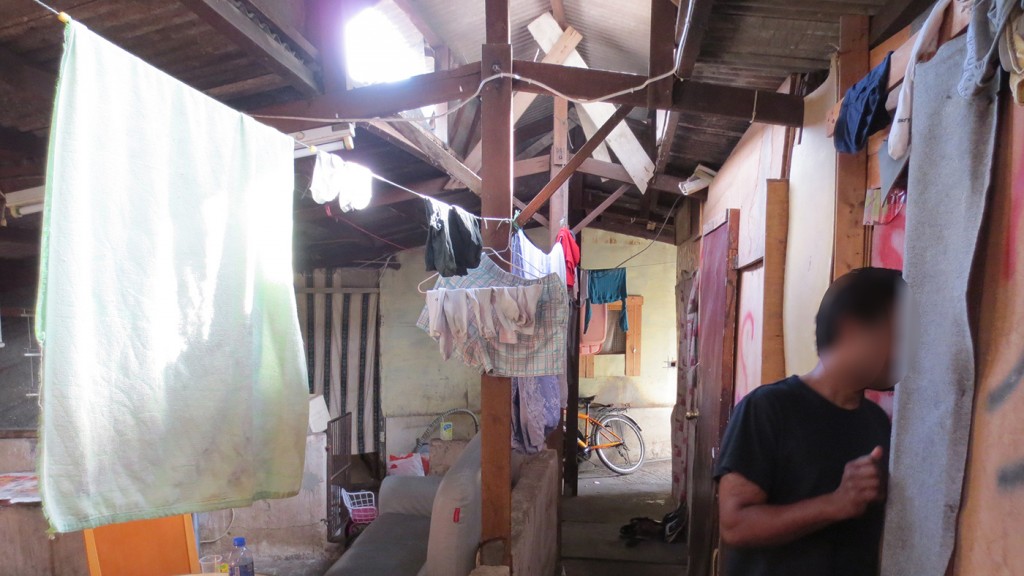
Rooting advocacy in dignity and respect
Jan 1st, 2015 | Advocacy, Rejection, VF Opinion, VF updates, programs, events | Comment
Dear VF members and supporters –
A refugee blogger reminded us that people should be judged by the breadth of their mind and the depth of their character, not by their social position or economic achievement, and certainly not by their immigration status imposed by states.
One would think that this fundamental notion should be generally accepted as obvious in our day and age, but does it consistently discharge ingrained preconceptions, cultural bias and ethnic stereotypes?
There is a wide range of views about what constitutes respect, a mindset that perhaps has less to do with how people are esteemed, and more to do with how others are treated. The Golden Rule might be taken as an acceptable universal standard, for it is found remarkably at the root of many cultures.
The Golden Rule states that, “One should treat others as one would like others to treat oneself.”
This ethic of reciprocity prescribes a mutual, two-way relationship between oneself and others that involves genuine equality in treatment, particularly as a fair formula to resolve conflicts. Advocates will recognize that this concept underpins most international treaties and many domestic laws relating to the treatment of those perceived with otherness, different or foreign, refugees or not.
In 2014 Vision First continued to undergo a significant evolution in order to replace a comfortable program-centered approach with a challenging watchdog core. This transformation didn’t come easy, but was necessary to adapt our agency to an emerging reality in the asylum sphere, which Vision First were instrumental in generating, namely, the emergence of the refugee activist.
Critics might lament that we are too radical, that we are incapable of collaborating and prefer to provoke conflict, than foster dialogue. We contend that the strong opinions informing our actions are supported by even stronger data extracted from the reality we observe daily.
Therefore we believe that the keystone is the Golden Rule in its cautionary form: “One should not treat others in ways that one would not like to be treated.” As unlikely as it is that we will ever experience the hardship of asylum, truth is that governments are increasingly irresponsive to citizen wishes and needs, other than the most powerful. What if one day we were humbled into calling for help and those we pleaded with turn the other way?
What would we think if forced to seek asylum in a country where protection was an empty, illusory promise? Would we then be outraged at a zero-percent acceptance rate? How would we appraise insufficient welfare without the right to work? Would we submit to living in rat-infested slums as directed by government contractors? Would we keep quiet if our food rations were pilfered? What would we tell our children if we couldn’t buy school books?
How would we then esteem a society that fails indifferently to act upon our grievances?
These might be questions far too remote and abstract for wealthy readers who enjoy, or so they believe, freedom of speech and social security. Such answers might reverberate in the warmer corners of our heart, where the spirit of humanity overshines misguided conformism and complacency.
We might find consolation in charity by giving to malnourished children in evidently distant geographies, but turn a blind eye to families suffering in our community. Would we sleep comfortably at night knowing that our donations might indeed cause more harm than good in the long run?
Vision First champions advocating fearlessly against injustice by consistently speaking bluntly to counter unfair policies and reprehensible activities, even when threatened with defamation. We are less concerned about what will happen to us personally, than the discrimination suffered by our members.
Perhaps the effectiveness of an advocate is best measured by what she is prepared to sacrifice, outside her obvious comfort zone, because personal misery has a distinctive way of clarifying one’s convictions.
Hong Kong is a hard and forbidding metropolis for those unfortunate enough to hold undesirable citizenship, or have experienced grim circumstances. It has been said that the measure of civilization and its moral progress should not be judged by the treatment of its highest people, but of its lowest. In this respect, each citizen decides whether to defer to power and privilege, or defend the vulnerable.
Vision First firmly contends that it is scandalous to hold anyone in poverty, want and insecurity. Our present mandate is to safeguard refugee rights and, as such, we shall redouble our efforts to counter unjust policies and intolerable practices apparently formulated to control rather than assist refugees.
Vision First thrives in conflict, open debate and change and we look forward to generating more in 2015.
Happy New Year!
New Year Message in PDF format
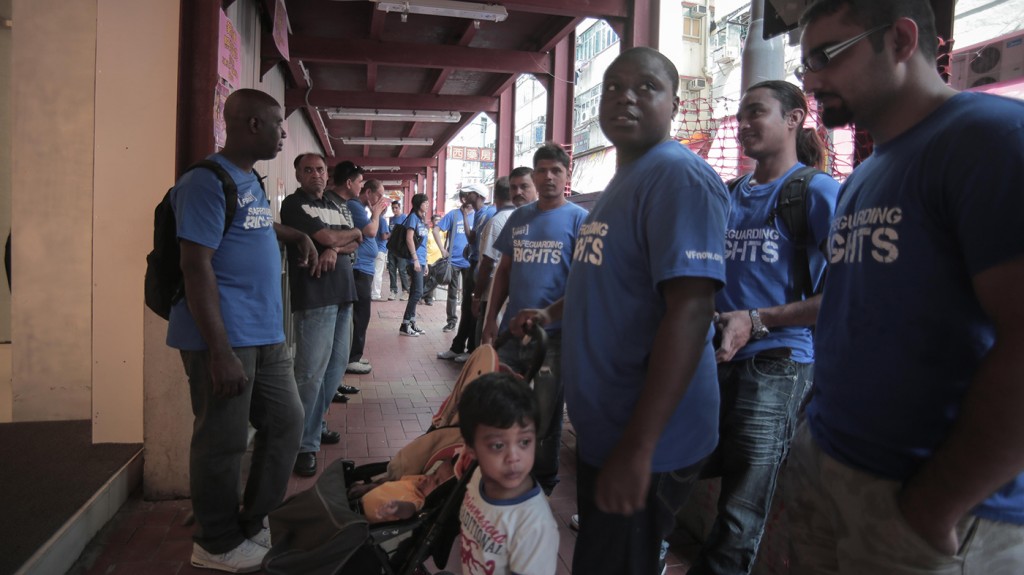
I am refugee
Dec 31st, 2014 | Crime, Personal Experiences, Refugee Community, Rejection | Comment
Does it matter who am I? Does it matter where I come from? I have been trapped in Hong Kong too long to distinguish between myself and the other thousands like me. I do not hear the clanging of gates, or the clinging of keys, but asylum stripped me of my freedom. It is prison by other means. I am refugee.
My life was torn apart by the insanity of war that makes no distinction between combatants and civilians. Nobody can sit on the fence, or claim neutrality, when the guns start firing. There are only two choices left: to fight or to escape. Either way the consequences become tragically unavoidable.
It so happens that I had travelled to China before and a valid visa permitted my hurried escape. I had never realized how expendable life was until I lost family and friends to human savagery. Such brutality reached me in the form of graphic photos that underscored how evil and vicious life can be.
That is the past and I have no way of changing it. I accepted my misfortune and my losses to avoid going mad wondering what might have happened had I made differently choices. The truth is that I lost the privilege of choosing after seeking asylum in a city-prison that doesn’t want me, but I am unable to depart.
Do I have the choice to opt out if I want to? Only if I could rewind time, could I avoid the invisible walls that imprison me in Hong Kong. There is no shame in my defeat, because events beyond my control swept me aside and sealed my cruel fate after destroying everything I cherished.
My life was interrupted by the shock of asylum when I realized that I will never be granted protection by HK government. Only 22 persons were granted asylum in Hong Kong out of 15,000 claimants since 1992. What are my chances? I have no future. Daily indignities destroy my self-respect as I beg for assistance with rent, food and incidentals, under threat of arrest and jail if I dare to work. I am refugee.
I believe that the dignity of a man is measured by the breadth of his mind and the depth of his character. Instead asylum labelled me a loser and tossed me in the garbage dump of humanity. I am worthless as I am denied legal status. I am powerless as I don’t have socio-economic rights.
Hong Kong judges me for what I have and by what I do for a living. I have nothing but the clothes I wear and I am prohibited from making a living, so I am disposable and easily forgotten. Nowadays so much value is given to social status and belongings that marginalized people are treated like lepers.
It is terribly ironic that by denying asylum, Hong Kong government also strips refugees of humanity. It feels like a huge betrayal of international treaties that these failures are glaringly self-evident: an effective zero-percent acceptance rate; endless waiting period; interminable assessment process stretched over years; protracted determination period that inevitably ends with rejection …
I felt profoundly betrayed when I realized that the Immigration Department’s asylum system was a farce. Never mind that the process stops and starts every few years and reforms are introduce with great fanfare, because results speak louder than words and justice cannot be heard.
(Name, Immigration and contact details provided)
